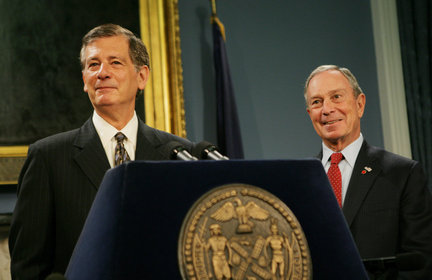Getting to Know Stephen Goldsmith, NYC’s New Deputy Mayor
 New York’s new deputy mayor for operations, Stephen Goldsmith. Photo: AP.
New York’s new deputy mayor for operations, Stephen Goldsmith. Photo: AP.As the new deputy mayor for operations, Stephen Goldsmith will soon be responsible for a portfolio of about a dozen city agencies, including NYCDOT, the NYPD, and the Office of Long-Term Planning and Sustainability. To a certain extent, the livable streets agenda will go through him. While Goldsmith may not have a direct role in shaping the
specifics of New York City transportation policy, by steering the
Bloomberg administration’s broad goals and political objectives, he’s going to influence what the city will and won’t do for livable streets over the next four years.
Unlike his predecessor, Ed Skyler, Goldsmith has a public record a mile long: He served as mayor of Indianapolis from 1992 to 1999 and has written six books on urban governance.
Goldsmith’s transportation agenda as mayor flowed from his belief in free market principles, said Fred Siegel of the Manhattan Institute, where Goldsmith is a senior fellow. One of the biggest fights of his mayoralty was a push to privatize much of Indianapolis’s bus system. The transit union was forced to bid against private companies for each route. "[Al] Sharpton came to Indianapolis," said Siegel, implying that this was a national-scale battle. Goldsmith believed that private transportation companies would adapt to changing travel patterns more adeptly than the public system had. He wrote in 1996 that competition brought bus fares down and increased ridership.
Some Indiana transit advocates, however, don’t see those benefits as having materialized. "Indianapolis is the 26th largest metropolitan area in the country yet our system is last of the top 100 metro areas in terms of transit service," said Tim Maloney, senior policy director at the Hoosier Environmental Council. The privatized routes have since mostly been brought back under the transit authority, he explained. "There’s universal community recognition today that we’re doing poorly."
Maloney sees the bus privatization effort in the context of a general disregard for environmental issues by the Goldsmith administration. "There was really no sustainability thread running through most of what he did," he recalled.
Connie Szabo Schmucker, former executive director of the Indiana Bicycle Coalition, gave us the lowdown on Goldsmith’s support of cycling while mayor.
The city’s first bike lanes were striped on his watch, she said, and a public-private partnership built a series of greenways across Indianapolis. "That said, I never got the sense that Mayor Goldsmith was ‘pro-cycling,’" said Schmucker, "especially not in the way our current mayor is." Indianapolis’ current mayor, Gregory Ballard, has established a Bicycle Advisory Council, the annual Mayor’s Bike Ride, and supported a plan to build over 200 miles of bike lanes.
Goldsmith’s writing also reveals something of his attitude towards urbanism. In his book, The Twenty-First Century City, published just after completing his time as mayor, he writes that "if we specifically designed a ‘suburban policy’ to drive investment out of cities, it would look a lot like the current system," with mortgage deductions subsidizing sprawl and transportation dollars being spent on interstates instead of transit. This argument is embedded in a larger libertarian critique of government; Goldsmith also blames environmental, labor, and disability-rights laws for imposing costs on cities.
As deputy mayor, Goldsmith will be responsible more for the operation of the departments he oversees than for their internal goals and objectives. Here’s how other observers and reporters have parsed his appointment:
- The Times reports that Goldsmith was hired to help the administration shift from a boom-time budget to a period of retrenchment.
- The Drum Major Institute’s John Petro
believes that by appointing Goldsmith, who was a leading policy advisor
for George W. Bush during the 2000 campaign, Bloomberg is trying to
inject more conservative and free-market principles into liberal New
York City. - Liz Benjamin
reads between the lines of the mayor’s announcement and sees the
Goldsmith pick as signaling big ambitions for Bloomberg’s third term.